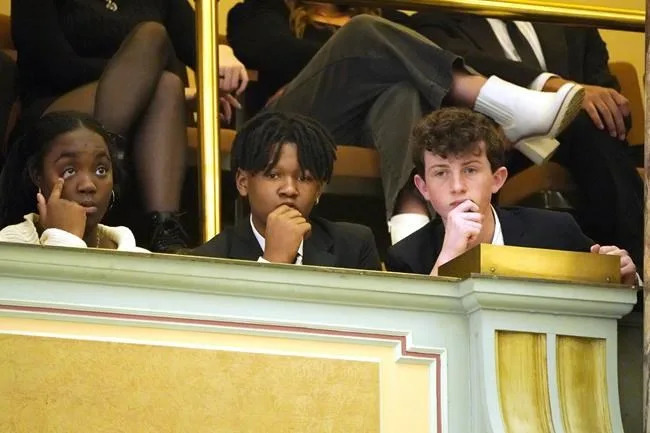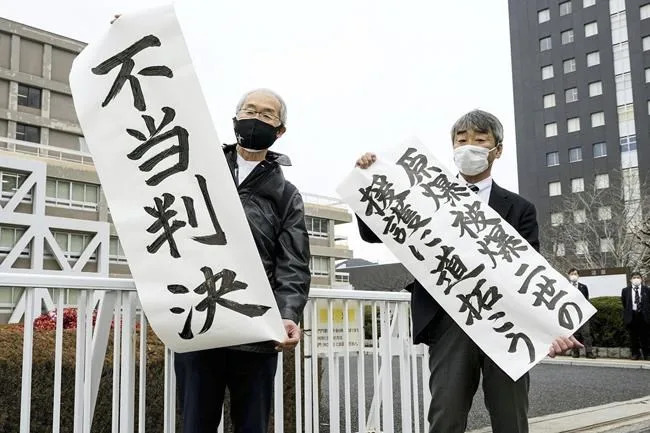AUSTRALIA
Labor’s safeguard mechanism does more to save the fossil fuel industry than it does the planet
Richard Denniss
Tue, 7 February 2023

Photograph: Joel Carrett/AAP
The enormous PEP-11 gas project off Sydney’s northern beaches is back in the headlines and the timing couldn’t be worse for a federal Labor government trying to rush a new climate policy through the parliament; a policy that does nothing to stop new gas and coalmines being built and doesn’t even stop major polluters increasing their emissions. Labor’s Madeline King must now remake the decision made by our undercover resources minister, Scott Morrison.
The gas project is so unpopular that, with an upcoming New South Wales election, even the Liberal premier, Dominic Perrottet, is campaigning against it. And federally, Labor is in a mad, but unnecessary, rush to get its new climate policy through the parliament. Unfortunately for the climate minister, Chris Bowen, the loudest supporters for his so-called safeguard mechanism are the fossil fuel industry. Just last week, Beach Energy, which is preparing to expand the Waitsia gas project in WA by 250 terajoules a day (that’s a lot), spoke up in its defence. There are 113 other gas and coal projects seeking approval in Australia, and by design, the safeguard mechanism will do nothing to stop any of them going ahead.
Related: Liberal MP Bridget Archer ‘open-minded’ on Labor’s push to overhaul climate safeguard mechanism
Not only doesn’t the Safeguard Mechanism stop new gas or coalmines being built, it doesn’t even require our existing major polluters to reduce their actual emissions. If passed, the new laws would allow polluters to actually increase their pollution as long as they buy some carbon offsets. Even if all the credits were of high integrity, which is a big if, the safeguard mechanism does not require a single company to actually begin to decarbonise.
Sign up for Guardian Australia’s free morning and afternoon email newsletters for your daily news roundup
While the safeguard mechanism’s reliance on unlimited offsetting is its biggest selling point for the fossil fuel industry, it is also the government’s weakest selling point when it comes to persuading the public and parliament that its laws must be passed in a hurry. The public don’t want PEP-11 or enormous new coalmines to go ahead, with or without offsets, they want real investment in the renewables, energy efficiency and the electrification of transport that will decarbonise our economy. The big swings to the Greens and teals at the last election were driven by a public hunger for more climate action, not more accounting tricks.
As the debate about the flaws of the safeguard mechanism heats up, some will inevitable argue that we risk “perfect being the enemy of the good” or even that we are on the brink of “another CPRS moment”. But there are enormous differences between the safeguard mechanism and Kevin Rudd’s carbon pollution reduction scheme. For starters, we are now only 27 years from our 2050 net zero target and we are still considering approving gas and coal projects that will operate until at least 2070.
But the biggest difference between the CPRS debate and the current scheme is the consequences of voting it down. The CPRS was a flawed but ambitious attempt to introduce an economy-wide carbon price. The safeguard mechanism, originally designed by the Abbott government, only applies to 215 big polluters and literally allows all of them to increase their emissions as much as they want as long as they buy some offsets. It does nothing to drive investment in renewables, nothing to boost electric vehicles or energy efficiency and, of course, nothing to stop new gas and coal projects from opening.
While Labor may have succeeded in wooing the fossil fuel industry with its climate policy, it certainly isn’t inspiring voters. By adopting a climate policy that lets polluters rely entirely on offsets, the government has lost the ability to build genuine public pressure on the Senate to pass its ineffective scheme. By Labor’s own logic, it wouldn’t matter if the safeguard mechanism didn’t pass in a hurry, as we could always just buy some more offsets next year.
The reality is the safeguard mechanism does more to safeguard the fossil fuel industry than it does to safeguard the climate. It hides its support for fossil fuel expansion behind a fig leaf of dodgy carbon credits and offsets.
Related: Chubb review recommends new integrity body for Australian carbon credits scheme
The last election was all about climate and integrity. And while Scott Morrison and his secret ministries might be gone, if his pro-pollution policies are protected in broad daylight, we will not only see more gas and coal projects and a runaway climate crisis, but we’ll likely see more teals, greens and independents elected to the crossbench at the next election.
The looming Senate battle will no doubt spark superficial claims of a return to the so-called climate wars. But the substantive policy question is whether the new parliament is serious about the climate integrity mandate people voted for. As the UN secretary general has urged “2023 is a year of reckoning. It must be a year of gamechanging climate action. We need disruption to end the destruction. No more baby steps. No more excuses.” And the science is clear: we are running out of time.
The Australia Institute is hosting the 2023 Climate Integrity Summit at Parliament House on 15 Feb. Dr Richard Denniss is executive director
UK
Government ‘negligence’ to blame for steel firm’s collapse, says union

Anna Wise, PA Business Reporter
Wed, 8 February 2023
Government negligence is to blame for the collapse of British steel business Aartee Bright Bar, a steelworkers’ union has claimed.
Aartee Bright Bar, which says it is the UK’s largest distributor of engineering steel products, called in administrators Alvarez & Marsal (A&M) on Tuesday after facing tough economic conditions and surging metal costs.
The leading trade union for steelworkers, Community, hit out at the Government for failing to act sooner over issues including increased energy costs, which have heaped pressure on struggling firms in the sector.
The West Midlands-based business has around 250 staff, operating from two productions sites in Willenhall and Dudley, and three distribution and sales offices in Rugby, Bolton, and Newport in South Wales.
It is not yet known whether there will be an impact on jobs following the insolvency.
Michael Magnay, joint administrator at A&M, said: “Like many businesses in its sector, Aartee Bright Bar has been facing significant headwinds as a result of the challenging economic environment and fluctuating steel prices.
“Against this backdrop, administrators have been appointed and we are exploring the options available to preserve value.”
Trade union Community argued that the business’s collapse was representative of the pressure the wider industry was facing, particularly from high energy and metal costs.
Alun Davies, national officer for Community, said: “The news of Aartee Bright Bar crashing into administration is extremely worrying.
“All parties must do whatever it takes to protect the workforce in this difficult process.
“These developments demonstrate the extreme pressures the industry is under.
“This is the price of Government’s negligence and its failure to act on issues like energy costs and procurement.”
The news follows reports last week that British Steel is planning to axe hundreds of jobs as part of closures of its coke ovens in Scunthorpe, according to a union source.
The Government is reportedly considering cash injections into both British Steel and Tata Steel UK.
But Charlotte Brumpton-Childs, national officer at the GMB union, said the Government’s investment was a “sticking plaster that does nothing to help the long-term structural issues affecting our steel industry”.
She added that the steel industry could “wither and die like so much of our proud manufacturing heritage” without meaningful support.
Furthermore, Liberty Steel revealed last month it was implementing the next stage of its restructuring programme which could affect up to 440 jobs.
The firm said it needed to refocus its operations in order to adapt quickly to the challenging market.
Liberty Steel, headed up by Sanjeev Gupta, counts Aartee Bright Bar as one of its customers, according to reports.
There are more than 33,000 people directly employed by Britain’s steel industry and a further 40,000 working in the steel supply chain, Community said.
Britain’s steel industry will be worth £6 billion by 2030.
Liberty Steel customer Aartee Bright Bar crashes into administration
Tue, 7 February 2023

A major customer of Britain’s third-biggest steel producer has been forced to call in administrators, deepening the financial gloom engulfing the industry.
Sky News has learnt that Aartee Bright Bar, which is based in the West Midlands and employs 250 people, has this week drafted in Alvarez & Marsal to handle an insolvency process.
Liberty Steel is part of the industrial conglomerate headed by Sanjeev Gupta.
Mr Gupta is reported to have close ties to Ravi Trehan, Aartee's founder, while Greensill Capital, the controversial supply chain finance group which itself collapsed in 2021, is said to have financed a number of trades between the two.
Michael Magnay, Joint Administrator at A&M, said in a statement issued to Sky News: "Like many businesses in its sector, Aartree Bright Bar has been facing significant headwinds as a result of the challenging economic environment and fluctuating steel prices.
"Against this backdrop, Administrators have been appointed and we are exploring the options available to preserve value."
A steel industry source said on Tuesday that Liberty Steel would be an obvious buyer of Aartee Bright Bar's assets out of administration.
A spokesman for Liberty Steel declined to comment, although a source close to it said it would "look at how it could help".
Aartee, which also has offices in Lancashire and Wales, is a manufacturer, stockist and distributor of steel products.
A statement purportedly made on behalf of Aartee Bright Bar, which was issued by email from Aartee Group, said: "Despite the very significant challenges facing the UK steel industry Aartee Bright Bar (ABB) has been making regular and substantial payments to its creditor FGI. It is therefore disappointing that FGI has chosen to enforce on a small remaining debt which the business has a plan to clear in the very near future.
"The management of ABB will work speedily to ensure the matter is resolved quickly with the administrator."
Its insolvency comes amid talks between the government and Liberty Steel's two larger competitors - Tata Steel and British Steel - about £600m of taxpayer funding to aid their transition to greener electric arc furnaces.
The funding for British Steel has been thrown into doubt by its Chinese owner's plan to axe about 800 jobs, mainly at its Scunthorpe plant.
Mr Gupta has also announced proposals to cut hundreds of jobs across his UK operations.
Florence mosaics renovation reveals devilish details
Ella IDE
Wed, 8 February 2023

Restorers launched a ground-breaking project in Florence's historic Baptistery Wednesday, allowing visitors a unique view of magnificent mosaics, including a three-headed devil which inspired Italian poet Dante.
For the next six years, tourists will be able to climb a specially-engineered, mushroom-shaped scaffold to examine up close over 1,000 square metres of richly-coloured and gold biblical depictions in the dome.
The cycle of medieval mosaics, made with an estimated 10 million tesserae measuring between five to 20 millimetres each, were designed by three generations of artists, including Cimabue, believed to be the painter Giotto's teacher.
"It will be the first -- and I hope last -- time that the public will be able to see these mosaics up close, because it will mean this restoration was a success," architect and project manager Samuele Caciagli told AFP.
The ceiling of the octagonal Baptistery, which sits opposite the Duomo in Florence's historic centre and which has hosted baptisms, including that of Dante Alighieri in 1266, was last restored over a century ago.
But now "there are cracks in every segment (of the dome) and a series of depressions... as well as detachments from the surface," Beatrice Agostini, who oversees the restoration team, told AFP.
- Rain, quakes, flood -
Florence's Opera di Santa Maria del Fiore organisation has been carrying out a 10-million-euro restoration of the whole building since 2014, with the white and green marble interior walls finished last year.
Scaffolding for the ceiling work had to be designed in such a way as to keep doors open to the over one million people who visit the Tuscan city's oldest religious monument every year.
The solution was a "mushroom", a central tower leading up to a 630-square-metre aluminium structure split over eight levels and hidden from the ground by a fabric "false ceiling".
From February 24, visitors to the platform, which sits over 30 metres (98 feet) up, will climb to stand face to face with Christ, cherubs, virgins, monks and monsters.
Horned Satan, depicted chewing on three sinners while nearby a naked victim roasts on a spit, is widely believed to have been a source of inspiration for the representation of Hell in Dante Alighieri's Divine Comedy.
The mosaics have suffered from rainwater infiltration, and have also been damaged by earthquakes and the flood that devastated the city in 1966.
- 'Secrets' -
Restorers from the Archaeological Conservation Center, which specialises in mosaics, began on Wednesday the mammoth task of mapping the tiny tesserae one by one, gently brushing away dust as they are photographed.
They will use ultrasound, georadar and thermal imaging tools, as well as pacometers, tools which will find pins and brackets used to prevent detaching mosaics from falling off during the last restoration in 1898 to 1907.
They will then reattach tesserae that are coming away and suture any cracks before "cleaning them to remove surface dirt that obscures the mosaic and its natural brilliance", Agostini said.
The restoration of the mosaics are expected to cost over 4.5 million euros ($4.8 million).
The origins of the Baptistery, where a 14th-century antipope is buried and which appears in Dan Brown's 2013 mystery thriller "Inferno", are debated by scholars.
Many believe it was initially a Roman temple dedicated to the god Mars. Construction of the building in its present form was finished in 1128 and in 1225 work began to entirely cover the dome with mosaic tiles.
It would take about 70 years to finish the eight segments.
Now, the restorers' mapping and exploration of the vivid world above "may reveal more of the little secrets this extremely enigmatic baptistery hides", Agostini said.
ide/ar/yad
Britain is only G7 economy in Europe with falling wages, warns OECD
Eir Nolsoe
Wed, 8 February 2023

Real wages in Britain are still falling even as workers in Germany and France see their wages rebound, new figures show.
The UK is the only European G7 country where incomes continued to fall last year after adjusting for inflation, according to the Organisation for Economic Co-operation and Development (OECD).
Figures published on Wednesday show average real income in Britain dropped by 0.6pc between July and September as soaring inflation chipped away at purchasing power.
That contrasted with average growth in real incomes of 0.2pc across OECD countries where data was available.
Households in Germany, France and Italy all saw their real incomes improve, with French families seeing the largest boost in purchasing power, at 0.8pc.
Incomes stagnated in the US and declined slightly in Canada over the period. However, Britain suffered the steepest drop across the OECD.
High inflation was to blame for the blow to household spending power, the OECD said.
In the UK, inflation was 8.7pc in the three months to September, while it was 8.5pc in Germany, 8.4pc in Italy and only 5.9pc in France.
Britain is suffering the largest loss of purchasing power since the oil crisis in the 1970s, according to a separate analysis published by the Office of National Statistics (ONS) on Wednesday.
Workers in the public sector have been most exposed to rampant inflation, the ONS said, although those in the private sector have also seen a real-terms decline in their earnings.
Overall, the UK is one of few countries where real household income per head has still failed to overtake pre-pandemic levels, according to the OECD.
“High consumer prices in the United Kingdom over the past year have continued to undermine household income when measured in real terms, causing real household income per capita to decline by 3.9pc [since 2019],” the OECD said.
Real incomes have also failed to recover from the pandemic in the Czech Republic, Denmark, Finland, Portugal and Spain.
The bleak figures add to pressure on the Bank of England and Rishi Sunak to bring rampant price rises under control. Mr Sunak has made halving inflation this year one of his cornerstone goals.
The OECD and ONS's findings come during another wave of mass strikes across Britain, as industrial disputes over pay and working conditions, triggered by soaring inflation, continue across the public sector.
Union threatens to cause blackouts with strike at Britain’s biggest power station
Matt Oliver
Wed, 8 February 2023

Drax - Ian Forsyth/Bloomberg
Workers at Britain's biggest power station have threatened to hold a series of strikes they claim will raise the risk of power cuts.
Trade union Unite claims the walkouts will effectively shut down the Drax Power Station, in North Yorkshire, straining electricity supplies and making it harder to keep the lights on.
The station can generate up to 4 gigawatts of electricity at full capacity, or roughly 7pc of national demand.
Unite’s decision to hold industrial action on February 20 and 27, March 6, 13, 20, 27 and April 4, 10 and 17 follows a dispute between the union and managers over pay.
Around 180 of the power station’s 470 staff will be involved in the industrial action, after Unite members narrowly voted to reject the offer of a 8pc pay increase.
Strike action “will close Drax down,” the union claimed, warning that Britain “could face power cuts” as a result.
Drax denied the walkouts would render the power station inoperable. It is understood that non-striking staff could be reassigned to keep all four biomass-burning units online. A spokesman said the company had “robust plans in place."
Separately, the boss of one of Europe’s largest energy suppliers warned that factories and households will need to cut energy use even more to avoid another surge in oil and gas prices.
Anders Opedal, chief executive of Norway’s Equinor, said “a further reduction in demand” would be needed to help refill gas storage sites.
Russian supplies that helped fill storage stocks for this winter have been largely cut off, leaving Europe more reliant on shipments of liquified natural gas from around the world.
Mr Opedal said: “Most likely we'll also be able to refill the storage for next winter. But that will require a further reduction in demand.
“There are unknowns such as the weather, both in Europe and Asia. Any supply disruption will also have an impact on the market. So I would say it's a little bit of a nervous market going forward.”
Both Europe and the UK have already cut energy use to get through this winter, with EU member states agreeing to cut gas demand by 15pc. In the UK, the Government launched an energy-saving campaign.
Equinor, which is majority-owned by the Norwegian state, became Europe’s largest supplier of natural gas last year, overtaking Russia. It is also the UK’s largest supplier.
On Wednesday the company posted a record $74.9bn (£62bn) profit, becoming the latest fossil fuel producer to report soaring returns following a year of high oil and gas prices.
In recent weeks prices have been declining from the highs reached last summer and this week the average pump price of diesel dropped below 170 pence per litre, shaving more than £16 off the cost of filling up a 55-litre car compared to last July.
Simon Williams, fuel spokesman at the RAC, said: “This is good news for drivers of diesel vehicles as they have had to endure some tough times with the average price of a litre nearly hitting £2 at the end of June.”
Wholesale diesel prices leapt following Russia’s invasion of Ukraine in February 2022 amid concerns about disruption to supplies as Russia is a major exporter of the fuel.
However, they have started to cool with Russian supplies still getting into the market, and other sources opening up to Europe.
Mr Williams said if retailers “play fair” with drivers, the price at the pumps should fall further given the relatively low wholesale prices, which are currently about 52.07p in the UK.
Drax power plant workers to strike nine times in three months
Alex Lawson Energy correspondent
Wed, 8 February 2023

Photograph: Adam Vaughan/EPA
Workers at one of Britain’s biggest power plants are preparing to go on strike nine times over the next three months in a dispute over pay.
More than 180 staff at the Drax plant near Selby, in North Yorkshire, plan to strike in February, March and April after rejecting a proposed pay deal.
Unite union has accused Drax of “classic corporate greed”, citing an increase in its profits, which jumped to £200m in the first half of its financial year, up from £52m in the same period a year earlier, helped by high electricity prices.
Unite said it had rejected an 8% pay rise and noted that the retail prices index (RPI) inflation rate was 13.4% in December.
The Unite general secretary, Sharon Graham, said: “This is a classic case of greed by a company which is already generating eye-watering profits. Drax is cynically seeking to boost its bonanza profits further by forcing workers to take a real-terms pay cut.
“Unite is now totally focused on the jobs, pay and conditions of its members and the workers at Drax will be receiving the union’s complete support.”
Unite claimed strike action would shut down Drax – which supplies about 6% of Great Britain’s power at times – and cause power cuts. The company refuted this claim and said it had “robust plans in place to ensure the power station continues to safely generate renewable electricity for millions of homes and businesses” in the event of industrial action.
A Drax spokesperson said: “We are deeply disappointed that Unite is planning to go forward with this unnecessary action which will see colleagues lose money instead of securing a significant pay rise. Drax remains open to dialogue with Unite to avoid industrial action.
“There are three trade unions representing colleagues at Drax power station and this offer has been accepted by Prospect, while GMB has stated it will not be taking industrial action.”
Drax, which has faced criticism over its use of biomass, said it had offered employees £2,000 each in recognition of their work extending the life of two coal units until March 2023. The units have been kept on standby at the request of National Grid.
The strikes at Drax are due to take place on 20 and 27 February; 6, 13, 20 and 27 March; and 4, 10 and 17 April.
The dispute echoes a standoff at UK Power Networks (UKPN), which supplies power to London and the south-east of England. Unite said on Monday said that 1,300 workers at the company would be balloted for strike action as they were unhappy with a pay rise of 7% for the current financial year.
Unite has previously accused UKPN and other networks of “rampant profiteering”.
Jackson water system a step closer to getting new owners
Tue, February 7, 2023

JACKSON, Miss. (AP) — Jackson’s troubled water system could be one step closer to getting new owners after legislation passed the state Senate Tuesday.
It's the latest development in a crisis that has left residents of Mississippi's capital without consistent access to running water and has aggravated divisions between the Democratic-led city and the Republican-controlled state government.
The bill would transfer ownership of Jackson's water system to a new regional public entity overseen by a nine-member board — with the majority appointed by state leaders. Sponsored by Republican Sen. David Parker of Olive Branch, it passed in a 34-15 vote and will move to the House for more work.
Parker said he introduced the bill to establish how the water system will be governed after Ted Henifin, the system's interim manager appointed by a federal court, concludes his work. Parker also said Jackson's water woes are stymying economic development.
“This crisis has been a black eye on the city of Jackson. But it's also been a problem for the state as a whole,” Parker said.
Parker recounted an incident where a German company was considering expanding to Mississippi. The company asked if the state had running water.
The water crisis has caused repeated outages in which many of the city's 150,000 residents have gone days and weeks without water to drink, cook, bathe or flush toilets.
Democratic senators rebuked the move as a brazen seizure of a city asset and overreach by the state government into Jackson's affairs.
“If we’re so concerned about our national reputation, are you aware of how we look right now?” said Sen. John Horhn, a Democrat from Jackson. “Mississippi looks like the old Mississippi that we heard about and some of us have lived through. We look like we are doing a taking on some Black folks.”
Jackson is an 80% Black city. Jackson Mayor Chokwe Antar Lumumba is Black, as are most of the lawmakers who represent the city in the state legislature. Lumumba has said he wants the city to maintain control of its water.
Under the bill’s original version, the Jackson mayor would have four appointments to the regional utility. On two of those, the mayor would have been required to “consult” with the mayors of suburban Byram and Ridgeland. The governor would make three appointments, and the lieutenant governor would make two. All nine would need to be confirmed by the Republican-controlled state Senate.
Parker brought a modified version of the bill to the Senate Tuesday, which he said was the product of a meeting with Lumumba. Under the new version the Senate approved, the mayor would not have to consult with the mayors of the smaller cities.
“This is not a problem that the current mayor of Jackson created, that he had had any control over," Parker said. “We have been given an opportunity with some federal dollars to try to fix this problem.”
Henifin has said that he believed Parker's proposal to create a new regional entity was motivated by a desire by state officials to access a large pot of federal dollars earmarked for the Jackson. Since then, Parker added language to the bill stating that all federal funds should be used within the areas served by Jackson's water system.
Parker said he has not met with Henifin, but they have a meeting scheduled later this month. The new version of Parker’s bill also specifies the regional board would be a “corporate nonprofit” — the model favored by Henifin.
Parker’s district is in northwest Mississippi, but he lives with his daughter at an apartment complex in Jackson when the Legislature is in session. He said scooping up water from the building’s swimming pool to use in their shared apartment’s toilets is part of what prompted him to introduce the bill.
The Republican-controlled House voted 83-28 Tuesday to pass legislation that says cities must base water bills on the amount of water a customer uses, prohibiting water billing based on the home’s value. The bill would outlaw a new billing system proposed by Henifin earlier this month. Lumumba watched the debate from a public gallery with other spectators.
___
Michael Goldberg is a corps member for the Associated Press/Report for America Statehouse News Initiative. Report for America is a nonprofit national service program that places journalists in local newsrooms to report on undercovered issues. Follow him on Twitter at twitter.com/mikergoldberg.
Michael Goldberg, The Associated Press
Court says South Korea responsible for Vietnam War massacre
Tue, February 7, 2023

SEOUL, South Korea (AP) — A South Korean court on Tuesday ordered the government to pay 30 million won ($24,000) to a Vietnamese woman who survived a gunshot wound but lost several relatives when South Korean marines rampaged through her village during the Vietnam War in 1968.
In awarding the compensation to 62-year-old Nguyen Thi Thanh, the Seoul Central District Court dismissed the government’s argument that it was unclear whether South Korean troops were responsible for the slaughter in the village of Phong Nhi in central Vietnam.
The court also rejected the government’s argument that civilian killings were unavoidable because the South Korean troops were dealing with Viet Cong guerrillas who often blended with villagers, according to Thanh’s lawyer, Lim Jae-sung. The government’s lawyers were also unsuccessful in invoking a statute of limitations.
The ruling marks the first time a South Korean court has found the government responsible for mass killings of Vietnamese civilians during the war and could potentially open the way for similar lawsuits. Then ruled by anti-communist military leaders, South Korea sent more than 320,000 troops to Vietnam, the largest foreign contingent fighting alongside U.S. troops.
South Korea’s Justice Ministry didn’t immediately respond to a query whether the government will appeal.
The government has never officially acknowledged responsibility for civilian massacres linked to South Korean soldiers in Vietnam, which some experts say were possibly responsible for thousands of deaths. Those atrocities haven’t meaningfully impacted official relations with Vietnam, whose growing economy benefits from South Korean investment.
According to U.S. military documents and survivors, more than 70 people were killed and around 20 others injured when South Korean marines allegedly fired at unarmed civilians as they swept through Phong Nhi and the nearby village of Phong Nhut on Feb. 12, 1968. The action came after least one South Korean soldier got struck and injured by nearby enemy fire.
Thanh, then 7 years old, was treated for gunshot wounds in her stomach while five of her family members died, including her mother, sister and brother.
According to U.S. military investigation records, U.S. Marines and South Vietnamese militia provided medical treatment to villagers who fled as South Korean soldiers continued to shoot inside the villages.
U.S. Marines later entered the villages and found piles of bodies in different areas, many burned or buried in ash. One U.S. soldier took photos which were used as evidence during Thanh’s trial.
Thanh filed the lawsuit against the South Korean government in 2020 and testified at the Seoul court last August. The trial also included the testimonies of other Vietnamese villagers and South Korean war veterans such as Ryu Jin-seong, a member of the marine unit linked to the attacks in Phong Nhi and Phong Nhut. He provided a first-hand account of how the South Korean soldiers shot at unarmed civilians, many of them children and women.
Thanh, who awaited the ruling in Vietnam, said she was “overjoyed” by her court victory.
“I think that the souls (of those who died in Phong Nhi) were always with me and supported me,” she said in a video message translated by her legal team. “I am overjoyed because I think that the souls can now rest easy.”
The South Korean government had argued there was no conclusive evidence that South Korean troops were responsible for the killings, even suggesting that the aggressors may have been Viet Cong fighters disguised in South Korean uniforms who were attempting psychological warfare.
The government also insisted that even if South Korean soldiers were involved, their aggressive response was defensible because they were facing constant threats from Viet Cong guerrillas who often hid among villagers and actively recruited young women.
Thanh’s lawyers pushed back at the claim, saying there was no way to justify the killings when South Korean veterans have consistently said they didn’t face any meaningful resistance or aggression from the villagers, who were rounded up and shot from close range.
Kim Tong-hyung, The Associated Press
Court denies aid for Hiroshima A-bomb survivors' children
Tue, February 7, 2023

TOKYO (AP) — A Japanese court on Tuesday rejected a damage suit filed by a group of children of Hiroshima atomic bombing survivors seeking government support for medical costs, saying the hereditary impact of radiation exposure is still unknown.
A group of 28 plaintiffs whose parents suffered radiation exposure in the Aug. 6, 1945, U.S. atomic attack were demanding the central government include them in the medical support available to survivors.
The Hiroshima District Court said the possibility of a hereditary effect from radiation cannot be denied, but there is no established scientific consensus and the government’s exclusion of the plaintiffs from medical support is not unconstitutional.
The government has insisted there is no scientific evidence showing a hereditary effect from parents’ radiation exposure on their children.
The plaintiffs filed a lawsuit in 2017 seeking 100,000 yen ($760) each from the government in damages, saying their exclusion violated the constitutional right to equality.
A similar lawsuit by their peers in Nagasaki was also rejected in December.
The plaintiffs said they plan to appeal Tuesday's decision, which they called “unjust."
“It was an extremely cold ruling,” plaintiff Taku Kakuda told reporters. “It was as if we were told to prove the radiation impact on humans with our bodies.”
The atomic bombing of Hiroshima destroyed the city and killed 140,000 people. The United States dropped a second bomb three days later on Nagasaki, killing another 70,000. Japan surrendered on Aug. 15, 1945, ending World War II and its nearly half-century of aggression in Asia.
Many survivors of the bombings have lasting injuries and illnesses resulting from the explosions and radiation exposure and have faced discrimination in Japan.
Their children, known as “hibaku nisei,” or second-generation survivors of atomic bombs, say they constantly worry about the possible hereditary effects of radiation from their parents’ exposure, and many have developed various forms of cancer and other health problems. They estimate their numbers at 300,000 to 500,000.
Currently, only survivors and those with prenatal exposure who were certified can receive government medical support for their radiation illnesses and cancer checkups. The government started providing free medical checks for their children in 1979 but cancer examinations are not included.
“We understand that the court acknowledged our argument,” Chief Cabinet Secretary Hirokazu Matsuno said of Tuesday's ruling.
Mari Yamaguchi, The Associated Press
LGBTQ groups demand Japan adopt equal rights law by G-7

TOKYO (AP) — Japanese LGBTQ people and rights groups condemned a recent discriminatory remark by a senior aide of Prime Minister Fumio Kishida, demanding his government enact laws to ban discrimination against sexual minorities, legalize same-sex marriage and guarantee equal rights before Japan hosts a Group of Seven summit in May.
Their comments at a news conference Tuesday followed remarks last week by Kishida aide Masayoshi Arai, who was fired after telling reporters he wouldn't want to live next to LGBTQ people and that citizens would flee Japan if same-sex marriage was allowed.
Despite Kishida's quick dismissal of Arai, a comment the prime minister made earlier last week raised questions about his intentions toward sexual minorities.
Responding to an opposition lawmaker’s question in parliament, Kishida said whether to allow same-sex marriage is “an issue that must be examined extremely carefully.” A decision requires a thorough examination of all of society “because the issue may change the concept of family and values as well as society," he said.
At Tuesday's news conference, LGBTQ activists and their supporters said while Arai's remarks displayed outright prejudice against sexual minorities, Kishida's equivocal comments suggested his reluctance to tackle the issue despite his earlier pledge to create an inclusive and diverse society.
“Discriminatory remarks by the prime minister's aide made it clear to the rest of the world that Japan is a country that does not care about the rights of sexual minorities," said Takako Uesugi, a lawyer and director of Marriage For All Japan, an organization campaigning for legalization of same-sex marriage.
Noting that Japan is the only member of the Group of Seven advanced industrialized nations that lacks a law protecting the rights of sexual minorities, she said, “We must say Japan is not fit to lead the G-7 summit if we leave the situation unaddressed."
They demanded the government immediately begin the process of legalizing same-sex marriage, establish a working team to study ways to guarantee the rights of sexual minorities, appoint an aide to the prime minister who specializes in sexual minorities' rights, and include statistics of same-sex couples in the national census.
Support for sexual diversity has grown slowly in Japan and legal protections are still lacking for lesbian, gay, bisexual and transgender people. They often face discrimination at school, work and at home, causing many to hide their sexual identities.
In recent years, more than 200 local municipalities, including Tokyo, have introduced certificates of partnerships for same-sex couples allowing them to rent apartments and sign documents in medical emergencies, and for inheritance. Still, the certificates are not legally binding and same-sex couples are often barred from visiting each other in the hospital and from getting access to other services available to married couples.
Campaigns for equal rights for sexual minorities have faced resistance from conservatives in Prime Minister Fumio Kishida’s governing Liberal Democratic Party. An attempt to enact an equality awareness promotion law ahead of the 2021 Tokyo Olympics was quashed by the party.
Amid national outrage over Arai's remarks, the party's secretary general, Toshimitsu Motegi, said he planned to start preparing for legislation to promote awareness of LGBTQ rights, but some conservatives have already shown resistance. A group of non-partisan lawmakers also said they hope to enact an equality law by the G-7 summit.
The activists noted Japan signed the G-7 Elmau summit communique in June which calls for “full, equal and meaningful participation of women and girls in all their diversity as well as LGBTIQ+ persons in politics, economics, education and all other spheres of society.”
“Kishida's lack of effort to establish legal protection is tantamount to promoting discrimination,” said Soshi Matsuoka, an activist who launched an online petition for laws promoting anti-discrimination and equality rights that has received more than 40,000 signatures since Sunday.
Tue, February 7, 2023
Stories of the Land explores human connections with natural world
Tue, February 7, 2023
Indigenous, scientific and artistic connections to the land converged in a cultural learning circle at artsPlace last week, sparking meaningful discussion about the future of the planet and our role in caring for it.
Stories of the Land provided a unique opportunity for cross- culture and disciplinary collaboration between Îyârhe (Stoney) Nakoda First Nation members, Bow Valley-based scientists and environmentalists, and the arts community. The event explored the history, diverse perspectives and knowledge systems surrounding peoples’ connection to the earth, as well as the importance of working together as a force for good toward conservation.
“We have to coexist with each other as people, those who came from across the pond and within our own Nations as well,” said Îyârhe Nakoda member Travis Rider and Indigenous liaison at artsPlace. “We also need to learn how to better coexist with the four-legged and live in harmony with nature.”
Rider was joined by Cory Beaver, Terry and Margaret Rider and others who spoke of traditional knowledge and the spiritual significance of the land to Îyârhe Nakoda First Nation, emphasizing the reciprocal relationship between Indigenous people and the earth, as well as the responsibility to care for and protect the land for future generations.
“Part of being able to coexist is understanding what that word means to Indigenous peoples,” said Rider. “We’re talking about the land, the animals. … We also have to keep in mind our children and grandchildren.
“You have to look down your family line and what you see [in nature] is what they also have to see.”
For Beaver, understanding the land, the way the ecosystem functions and the issues it faces is inherent to feeling connected to it. Beaver’s ancestors were some of the original stewards of the environment surrounding Chuwapchîchiyan Kudebi (Canmore). They followed animal migration patterns, controlled wildlife populations through hunting, and tracked weather systems to camp and navigate within the landscape before having their movements restricted by reservations.
“The way those that came before us understood these things, it was all interconnected through the way a plant grows, the way the trees stand and the river flows,” said Beaver.
While some park conservation plans are changing to now include Indigenous consultation – including Banff National Park – colonial ways of thinking have taken over conservation efforts following the introduction of national and provincial parks across Canada.
Over the last 30 years, ecologist John Paczkowski has observed many changes in wildlife populations and behaviours as a large predator expert in the Bow Valley.
“I remember coming here and it was a lot more common to see wolves around Canmore and the kills they were making,” said Paczkowski. “We had collared wolves and were tracking them, and they’re quite a rarity now coming through Canmore.
“It’s sort of heartbreaking.”
Cooler temperatures throughout the Bow Valley late into last year’s spring season led to crops of fewer berries, resulting in bears seeking out other sources of food in town, including garbage.
“They were interacting more with people and getting into trouble,” said Paczkowski. “It makes you reflect on the impacts that we’re having on the landscape here, whether it’s fire suppression or just taking up more of that habitat.
“Over the years I’ve been able to see that change and what it means to the bears and how they behave, how they react.”
Last year, a mamma black bear and her three cubs were relocated to an area west of Caroline in mid-September after they bolted into a downtown Canmore restaurant and accessed bags of brown sugar.
The bears were eventually euthanized when the sow and two of her cubs returned to Canmore by early October, where they were reported to have been feasting on garbage in a downtown dumpster and sleeping in backyards over a period of several nights. The third cub was believed to have died on the difficult and lengthy journey back to town.
The circle discussion, which was organized in partnership between artsPlace, the Banff Canmore Community Foundation (BCCF) and the Biosphere Institute of the Bow Valley, stressed the need for collaboration between traditional knowledge and science to make informed decisions about the future of the environment if humans are to coexist with wildlife while going a step further allowing native species to flourish.
“I would wish that in 200, 300, or 400 years, that there’s still bears moving through this valley and that there will still be an ecosystem that functions to support the natural world as I know it now, or maybe as it was in the past,” said Paczkowski. “An ecosystem that’s not just hanging on by its claws, but flourishing.”
As discussions continued into the evening, artist Laurelle Birk encouraged attendees to step into the circle and add various harvested elements, including pinecones, grasses, berries and branches to a land-based mandala design growing on the floor.
The mandala, separated into four quadrants, not unlike many Indigenous representations of a medicine wheel, was a powerful visual representation of some of the deep connections humans have with the natural world and the need for a relationship which achieves balance and harmony.
The event was seeded in the collaborative work of Moving Mountains, a BCCF initiative in partnership with the Town of Canmore and the Town of Banff that is taking a regional, Bow Valley-wide approach to strengthening civil society across communities in the region.
Moving Mountains is hoping to host the same session in Mînî Thnî (Morley) and out on the land in Kananaskis Country in upcoming months. For more information, visit banffcamorecf.org/programs-events/moving-mountains.
Jessica Lee, Local Journalism Initiative Reporter, Rocky Mountain Outlook










